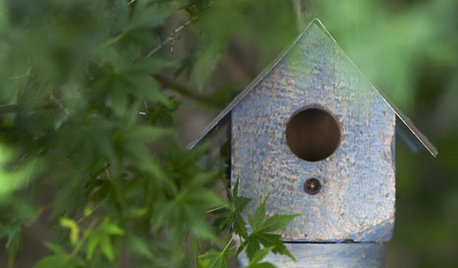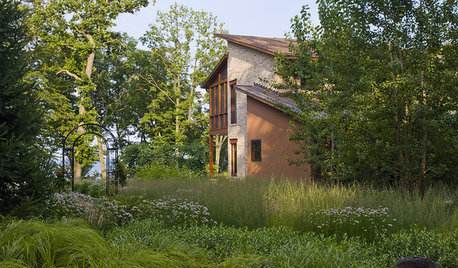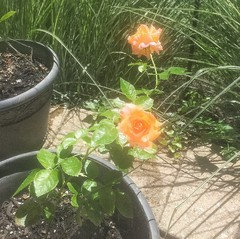Help! Roses suddenly covered in brown patches!
nat1611
8 years ago
Featured Answer
Sort by:Oldest
Comments (36)
nat1611
8 years agoRelated Discussions
brown patch? plythim blight? webworms? with pics
Comments (45)"But wait... the EPA site doesn't say whether or not cornmeal can be put on my lawn" Yes they do. Corn meal is listed as an inert ingredient by the EPA. What they don't say is that corn meal can be used to treat lawn disease. They specifically say chlorothalonil shouldn't be used for home lawns because it poses a danger. It was previously labeled for home lawn use but now they banned it in home lawns. So someone can't sell you a bag of corn meal and tell you it's a fungicide and a licensed lawn care company can't apply it as a fungicide treatment (or fertilizer in most states) but it has not been labeled as being harmful. There's a big difference between a toxic, possible carcinogen that has been banned by the EPA and a substance that is safe to eat, is allowed to be used with other ingredients and just hasn't been registered as a pesticide....See MoreNew Lawn Woes - Patch Brown, What to do??
Comments (3)Well I have a few more questions - I think I do need to relax a litlte but I was trying to get the whole history there! Anyways - hard to tel from the overall picture - but right now we have a TON of weeds on the hilly areas that took a lot longer to fill in. I tried pulling some by hand but didn't make much progress - there are literally probably in a give 3x3 area probably 5-6 crabgrass growing. I know they are annual and will die but should I be trying to pull out at least the biggest offenders? A few more very specific questions: 1. How often should I be watering? Right now I have 14 zones, i am running each zone for 30 minutes. I run zones 1-7 on one day and zones 8-14 on the opposite days. IS this too often? Shoudl I only be watering every 3rd day? 2. In the backyard, my grass is barely growing at all. We had a very heavy rainstorm a few weeks ago and I think all the nutrients were washed from the soil. I literally have no growth at all back there. Should I put some fertilizer down; or is that too risky in July? 3. When should i overseed the lawn? IS it OK to try and patch areas now that are completely bare? I had been scraping the surface, putting down the seed, and then putting peat moss on top previously. 4. After the sprinkler system install I have really nice "lines" going across the lawn where they dug the trenches. The earth is elevated at these parts. How do I flatten out my lawn again? Does this just take time; or should I try rolling it? (keep in mind lawn is only 10 weeks old) Thanks -...See MoreSudden brown patches in grass -- what could be causing it?
Comments (4)Reprogram it immediately for 3x per week and about 25% more time. The goal here is to reach once a week watering, a full inch at a time (if nature hasn't delivered it). For that reason, I'm not a fan of auto-programmed timers unless they've also got an integrated moisture monitor or ET (evapotranspiration) sensor. Every two to three weeks, remove 1 of the weekly waterings and increase the time appropriately. Also, measure the amount of water going down by putting used tuna cans on the lawn (tuna cans happen to be almost exactly an inch, so you can get a good visual guide). If it rains, it counts, and if I have to irrigate I often try to time it with a rainfall (the neighbors think I'm insane) to bring the total up to 1". Watering excessively tends to encourage thin, weak roots and (ta da!) fungal diseases. Plus excess weeds, insect problems, and so on. In southern Minnesota, you're going to be able to get away with less than once a week through most of the season, but probably not in July and August. Here in eastern Pennsylvania, I last irrigated in May. The lawn looks great, but we've had a fair amount of rain through June and July, and while August is drier, we're getting enough to hold the lawn with no issues....See MoreBrown circle spots. Is it brown patch? Summer patch? Chinch bugs?
Comments (25)cut & paste from another thread this morning: "Quinclorac kill crabgrass. It's the active ingredient in Drive XLR8, you can use any brand and it will work. Some people (reeljake) uses Sulfosulfuron (Sedge Ender) and it works fine as well. People have have pretty good results keep most weeds out of their bermuda with Celsius and Sulfosulfuron. Plus there is no issues related to applying in hotter temps. Reeljake also uses Dimension with active ingredient dithiopyr as his pre-emergent, I use Prodiamine. With either you want year round coverage to keep ALL WEEDS from germinating. You will need to start your PreM asap to keep winter weeds at bay, then again in Spring for Spring/Summer weeds. PreM: Prodiamine or Dimension Crabgrass: Quinclorac or Sulfosulfuron General weeds (post-emergent): Celsius - 2,4-D will work also but turns grass yellow If you get the correct products, it won't matter what the weed is, it either will never germinate in your yard, thanks to the PreM, or will die when sprayed with the post-emergent."...See Morenat1611
8 years agocecily
8 years agonat1611
8 years agonat1611
8 years agonat1611
8 years agonat1611
8 years agonat1611
8 years agojim1961 / Central Pennsylvania / Zone 6
8 years agolast modified: 8 years agonat1611 thanked jim1961 / Central Pennsylvania / Zone 6jim1961 / Central Pennsylvania / Zone 6
8 years agolast modified: 8 years agonat1611 thanked jim1961 / Central Pennsylvania / Zone 6summersrhythm_z6a
8 years agoDingo2001 - Z5 Chicagoland
8 years agosummersrhythm_z6a
8 years agonat1611
8 years agonat1611
8 years agonat1611
8 years agojerijen
8 years agomsdorkgirl
8 years agonat1611
8 years agonat1611
8 years agolast modified: 8 years agojim1961 / Central Pennsylvania / Zone 6
8 years agolast modified: 8 years agonat1611
8 years agomichaelg
8 years agonat1611
8 years agoBuford_NE_GA_7A
8 years ago
Related Stories

PETS6 Ways to Help Your Dog and Landscape Play Nicely Together
Keep your prized plantings intact and your dog happy too, with this wisdom from an expert gardener and dog guardian
Full Story
HOUZZ TOURSMy Houzz: Saturated Colors Help a 1920s Fixer-Upper Flourish
Bright paint and cheerful patterns give this Spanish-style Los Angeles home a thriving new personality
Full Story
COLORPick-a-Paint Help: How to Quit Procrastinating on Color Choice
If you're up to your ears in paint chips but no further to pinning down a hue, our new 3-part series is for you
Full Story
COLORPaint-Picking Help and Secrets From a Color Expert
Advice for wall and trim colors, what to always do before committing and the one paint feature you should completely ignore
Full Story
COLORPick-a-Paint Help: How to Create a Whole-House Color Palette
Don't be daunted. With these strategies, building a cohesive palette for your entire home is less difficult than it seems
Full Story
SELLING YOUR HOUSEHelp for Selling Your Home Faster — and Maybe for More
Prep your home properly before you put it on the market. Learn what tasks are worth the money and the best pros for the jobs
Full Story
DECLUTTERINGDownsizing Help: How to Edit Your Belongings
Learn what to take and what to toss if you're moving to a smaller home
Full Story
GARDENING AND LANDSCAPINGBe a Citizen Scientist to Help Wildlife, Learn and Have Fun Too
Track butterflies, study birds, capture stars ... when you aid monitoring efforts, you’re lending Mother Nature a hand
Full Story
GARDENING GUIDES8 Unthirsty Plants Help You Save Water in Style
Spend less effort and money on your landscape with drought-tolerant and native plants that liven up your yard
Full Story
DECORATING GUIDESDownsizing Help: Color and Scale Ideas for Comfy Compact Spaces
White walls and bitsy furniture aren’t your only options for tight spaces. Let’s revisit some decorating ‘rules’
Full Story
















jerijen